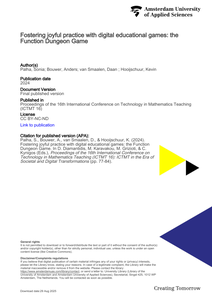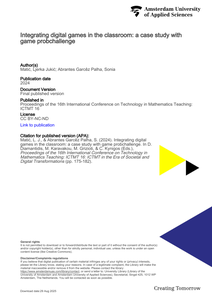In this paper we present an educational digital game, Function Dungeon, that we developed for learning about functions in a playful way. Results from a pilot conducted with fourteen 13-year-old students in a school in the Netherlands show that the game can foster ‘joyful practice’. That is, students experience fun and sense of control while practicing mathematics. Findings from this study contribute to the development of knowledge about digital educational games and its potential to transform traditional practices in education.
DOCUMENT

The Internet and computers increasingly determine our daily lives. This goes for almost everyone in the Netherlands. Still, it is mostly teenagers who are well informed on how to use all the possibilities of new technologies. They are building a digital world of their own that parents usually know very little about. This booklet intends to inform teachers, parents and other interested parties on what teenagers are actually doing online and how important it is to keep abreast of the new developments that the Internet and computers bring into their world. On the basis of research into these issues in the Netherlands and abroad we attempt to indicate what the digital world of teenagers looks like and how it differs from that of grown-ups. What do they do, exactly, and why? We also look into teenagers’ ICT behaviour and into dangers and abuse of the Internet. Moreover we provide tips for parents and teachers on how to handle certain phenomena. This book does not pretend to provide an exhaustive overview of the digital world of teenagers. It is focused on some important characteristics and parts of that world. It reports on research of the INHOLLAND Centre for eLearning into various aspects of ICT behaviour among teenagers. The research was undertaken in the spring of 2006, focusing mainly on texting, networking, gaming, dangers and abuse on the Internet and the digital relation between school and the home. Ultimately we are especially concerned with the question of what teenagers really learn in their digital world, and how education can profit. This book also addresses that issue.
DOCUMENT

This paper reports how a mathematics teacher uses a digital game for learning and teaching in the classroom. We utilize a case study approach to examine the pedagogical activities present in the lesson. The results of the study indicate that not all of the lesson objectives were met. Even though the teacher planned the lesson and the activities for the students, his lack of knowledge about gamebased pedagogy had an impact on the learning outcomes.
DOCUMENT

Digital game-based learning (DGBL) can be regarded as a promising teaching pedagogy to prepare students for challenges of the 21st century. However, the incorporation of digital games into K-12 curricula remains limited. Research suggests that a comprehensive understanding of barriers and motivational factors that teachers face when implementing DGBL is needed to ensure that teachers can receive the support required. To delineate suggestions for tailored curricula on game-based pedagogy in teacher education programs, we conducted a study to gain insight into in-service teachers’ perception of DGBL in relation to their previous experience in teaching with DGBL. To achieve our goal, we examined the factors that impede and promote the implementation of DGBL among in-service teachers who are presently pursuing master's level education programs, having in mind that this group of teachers is different from pre-service teachers. Data was collected using an online survey with open- and closed-ended questions. The sample consisted of in-service teachers (n=37) who were enrolled in a master’s course in math education. The data analysis conducted was of a qualitative nature. One significant finding derived from this study is that the level of pedagogical experience in utilizing games as a teaching tool appears to be a crucial factor in understanding the inclination of in-service teachers towards game-based pedagogy. Pedagogical factors were mentioned by teachers at all stages of experience with DGBL, and differences were observed between teachers at different stages. For instance, in-service teachers with experience with DGBL (intermediate and advanced stages) were concerned about being able to maintain focus on the math concepts, the need to adapt the game lesson to students, and the ways to evaluate student learning less experienced teachers were essentially concerned about ways to control the classroom during DGBL and whether the pupils would receive adequate practice in this learning mode. Differences were also noted for other factors between teachers at different stages. Advanced stage teachers did have concerns about game appropriateness for the intended learning; teachers with less experience were concerned about the lack of games (technical factors). Dealing with an existing curriculum and high workload were common aspects for teachers with no or some experience but only teachers with some experience mentioned obstacles related to school organization (structural factors). Teachers with few and some experience referred to the lack of knowledge and competence (personal factors) and that pupils would not take the lessons with games seriously (social factors). This research supports DGBL- practice (i) by adding new knowledge on the factors that can support or constrain the integration of DGBL and its implications for the development of curricula on game-based pedagogy; (ii) by providing suggestions to design and implement meaningful curricula on digital game-based pedagogy for teaching education and training programs.
DOCUMENT

Er is al veel geschreven over de generatie die is opgegroeid met de vanzelfsprekende aanwezigheid van de moderne informatie- en communicatietechnologie en het internet als virtuele wereld, maar de consequenties voor het onderwijs worden nog onvoldoende onderkend. Het belangrijkste probleem is dat de generatie die onderzoek doet naar veranderend leergedrag behoort tot de digital immigrants, terwijl zij uitspraken doet over de generatie die behoort tot de digital natives (Prensky, 2006). De digital immigrants zien de informatie en communicatietechnologie als een aanvulling op reeds ontwikkelde routines, en dat betekent dat de mogelijkheden van die technologie ook vanuit dat perspectief worden beoordeeld. De routines van de digital natives zijn geworteld in deze technologie en werden erdoor gevormd.
DOCUMENT

This paper aims to present a systematic literature review on state-of-the-art Educational Escape Rooms (EERs) with the use of digital technologies. More specifically, the focus of the study is to present the current developments and trends concerning Digital Educational Escape Rooms (DEERs) and investigate how they foster learning outcomes for online learners. Additionally, the present study provides insights into the design process of such technology enhanced EERs. This review is attributed to identifying and covering research gaps since the current literature has focused on the pedagogical aspects of Escape Rooms (ERs) in education, but no studies seem to have been conducted in regard to the pedagogical implications of Digital Escape Rooms (DERs) in educational environments. Based on the exhaustive literature review, an agenda for future research is promised and the implications for designing innovative ER approaches have been highlighted. The anatomy of the fundamental components of conducting systematic literature reviews was followed. The results of the review could be addressed to multidisciplinary teams related to education, game researchers, educational researchers, faculty members, scholars, instructors, and protagonists of educational systems to encourage them to thoroughly study the core elements of DEERs and how they can be applied in virtual educational contexts to facilitate students’ learning achievements.
DOCUMENT

Game User Research is an emerging field that ties together Human Computer Interaction, Game Development, and Experimental Psychology, specifically investigating the interaction between players and games. The community of Game User Research has been rapidly evolving for the past few years, extending and modifying existing methodologies used by the HCI community to the environment of digital games. In this workshop, we plan to investigate the different methodologies currently in practice within the field as well as their utilities and drawbacks in measuring game design issues or gaining insight about the players' experience. The outcome of the workshop will be a collection of lessons from the trenches and commonly used techniques published in a public online forum. This will extend the discussion of topics beyond the workshop, and serve as a platform for future work. The workshop will be the first of its kind at CHI, tying together HCI research and Game User Research.
DOCUMENT
This paper addresses the procedural generation of levels for collaborative puzzle-platform games. To address this issue, we distinguish types of multiplayer interaction, focusing on two-player collaboration, and identify relevant game mechanics for a puzzle-platform game, addressing player movement, interaction with moving game objects, and physical interaction involving both players. These are further formalized as game design patterns. To test the feasibility of the approach, a level generator has been implemented based on a rule-based approach, using the existing tool called Ludoscope and a prototype game developed in the Unity game engine. The level generation procedure results in over 3.7 million possible playable level variations that can be generated automatically. Each of these levels encourages or even requires both players to engage in collaborative gameplay.
DOCUMENT

In order for techniques from Model Driven Engineering to be accepted at large by the game industry, it is critical that the effectiveness and efficiency of these techniques are proven for game development. There is no lack of game design models, but there is no model that has surfaced as an industry standard. Game designers are often reluctant to work with models: they argue these models do not help them design games and actually restrict their creativity. At the same time, the flexibility that model driven engineering allows seems a good fit for the fluidity of the game design process, while clearly defined, generic models can be used to develop automated design tools that increase the development’s efficiency.
DOCUMENT

Design and development practitioners such as those in game development often have difficulty comprehending and adhering to the European General Data Protection Regulation (GDPR), especially when designing in a private sensitive way. Inadequate understanding of how to apply the GDPR in the game development process can lead to one of two consequences: 1. inadvertently violating the GDPR with sizeable fines as potential penalties; or 2. avoiding the use of user data entirely. In this paper, we present our work on designing and evaluating the “GDPR Pitstop tool”, a gamified questionnaire developed to empower game developers and designers to increase legal awareness of GDPR laws in a relatable and accessible manner. The GDPR Pitstop tool was developed with a user-centered approach and in close contact with stakeholders, including practitioners from game development, legal experts and communication and design experts. Three design choices worked for this target group: 1. Careful crafting of the language of the questions; 2. a flexible structure; and 3. a playful design. By combining these three elements into the GDPR Pitstop tool, GDPR awareness within the gaming industry can be improved upon and game developers and designers can be empowered to use user data in a GDPR compliant manner. Additionally, this approach can be scaled to confront other tricky issues faced by design professionals such as privacy by design.
LINK